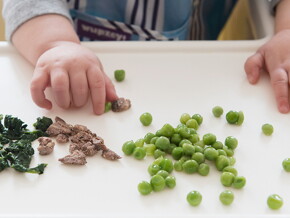
Toddler Talk: Hunger Signs & Fullness Cues
Your toddler is a master at solid foods already—and he’s a grown up now who wants to be heard. Expressing his desire to eat and getting a response from you are important for his social and emotional development. Allow him that as best as possible, but don’t let him make the rules.
Cheers Mommies and Daddies! When it comes to parenting, especially in our vibrant Filipino culture, the dining table is often the heart of the home. It's where values are passed down, stories are shared, and of course, where we ensure our little ones are well-nourished. But as any parent knows, feeding toddlers can sometimes feel like negotiating at a “palengke”.
Understanding Your Toddler’s Appetite Signals
First things first, hunger signs. Your toddler might not always say "I’m hungry," but they have their ways of letting you know. Is your toddler suddenly cranky or irritable? Are they pointing at food or opening their mouths when food is near? That's their language of hunger.
And when they've had enough, they'll show fullness signs too. Turning away from food, playing with their spoon, or even pushing their plate away — these are all silent whispers of "I’m already full, Mama."
Independence at the Table
Now, let's talk about independence. Yes, even our little ones seek it. And why not? When your toddler insists on feeding themselves, even if it means rice scattered everywhere, they're not just making a mess, they're saying, "I can eat on my own!" It's messy, but it's them learning. Experts say encouraging this independence is crucial and is actually part of your child’s healthy development.
Psychology Behind the Spoon
So, why do toddlers act like little bosses at meal times? It's simple — they're exploring their autonomy. It's their way of testing boundaries and asserting their will. Giving them a bit of control can actually encourage better eating habits.
When Feeding Becomes a Telenovela
But what about when they're as picky as a Tita choosing mangoes? Or when every meal feels like a teleserye of tears and tantrums? Ah, the life of parenting picky eaters. It's not all lost, dear parents. Here are a few tips:
- Keep it regular: Have meals and snacks at regular times to create a routine.
- Make food fun: Who says you can't play with food? Make a game out of eating veggies. "Subo the little boat (spoon) into the cave (mouth)."
- Involve them: Let them help during food preparation and cooking. The more they touch and experience food, the less scary it becomes.
Balancing the Scales
Realistically speaking, it's easy to overlook how much our kids eat. How do we know if they're eating too much or too little? It is best to watch out for their energy levels and how their clothes fit over time. And remember, every child is unique.
Tips for the Tough Times
And when the going gets tough, here's what to remember:
- Patience, patience, patience: It's a virtue for a reason.
- The power of choice: Give them options. Would they like kalabasa or carrots today?
- Praise the good: When they try something new, celebrate it! "Good job!"
Final Thoughts
Feeding and nurturing your toddler is a journey of profound significance, filled with moments that offer immense opportunities for growth, learning, and bonding. This path, marked by the unpredictable challenges of decoding hunger cues, fostering independence, and managing picky eating, calls for patience, understanding, and creativity. By establishing regular routines, making mealtime an engaging experience, and involving your child in the food preparation process, you can do more than meet his nutritional needs – as they cultivate healthy habits and self-reliance in your child. This journey requires a careful balance between providing proper nutrition and honoring the individuality of your child through attentive guidance and respect.
Thanks for reading, and here's to raising healthier, happier, and independent kids!
















